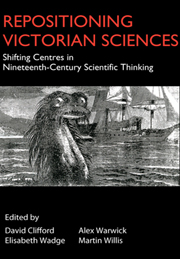Book contents
- Frontmatter
- Contents
- Notes on Contributors
- 1 Margins and Centres
- SECTION I Shifted Centres
- SECTION II Contested Knowledges
- SECTION III Entering The Modern
- 13 Fresnel's Particular Waves: Models of Light as Catalytic Modes of Worldmaking in Early Modern Times
- 14 Re-imagining Heaven: Victorian Lunar Studies and the Anxiety of Loneliness
- ‘You Should Get Your Head Examined’: Freudian Psychoanalysis and the Limits of Nineteenth-Century Science
- 16 Scholars, Scientists and Sexual Inverts: Authority and Sexology in Nineteenth-Century Britain
- 17 Unmasking Immorality: Popular Opposition to Laboratory Science in Late Victorian Britain
- Notes
- Select Bibliography
17 - Unmasking Immorality: Popular Opposition to Laboratory Science in Late Victorian Britain
from SECTION III - Entering The Modern
Published online by Cambridge University Press: 05 March 2012
- Frontmatter
- Contents
- Notes on Contributors
- 1 Margins and Centres
- SECTION I Shifted Centres
- SECTION II Contested Knowledges
- SECTION III Entering The Modern
- 13 Fresnel's Particular Waves: Models of Light as Catalytic Modes of Worldmaking in Early Modern Times
- 14 Re-imagining Heaven: Victorian Lunar Studies and the Anxiety of Loneliness
- ‘You Should Get Your Head Examined’: Freudian Psychoanalysis and the Limits of Nineteenth-Century Science
- 16 Scholars, Scientists and Sexual Inverts: Authority and Sexology in Nineteenth-Century Britain
- 17 Unmasking Immorality: Popular Opposition to Laboratory Science in Late Victorian Britain
- Notes
- Select Bibliography
Summary
British science in the early twenty-first century seems largely institutionalized; sophisticated laboratories, commercial companies and governmental organizations control the production and distribution of scientific knowledge to such an extent that it is difficult to imagine that science was not always part of the British hegemony. Indeed, there is a popular, if ahistorical, perception that science has always been practised from within such a power structure. Despite the continued opposition of, among others, animal rights activists and certain scientific ethics lobbying groups, professional science appears insulated against, and unconcerned by, any voices raised in protest. Yet, the rise of the scientific institution in the late nineteenth century reveals that the central and dominant position of professional science did not go uncontested and that public resistance was not as marginalized as it appears today. State-supported (if not funded) scientific laboratories, the most important symbol of professional science in the last quarter of the century, found to their cost that the ideology of institutional science was anathema to some sections of the Victorian public and to try to sideline their contribution to scientific debates would result in voluble opposition.
The founding of the British Institute of Preventive Medicine in 1889 is one of those important moments in the history of the scientific laboratory that reveals how professional scientific culture was once a site of vigorous and violent conflict over authority.
- Type
- Chapter
- Information
- Repositioning Victorian SciencesShifting Centres in Nineteenth-Century Thinking, pp. 207 - 218Publisher: Anthem PressPrint publication year: 2006
- 3
- Cited by



